
Find Help
More Items From Ergsy search
-
Are prepayment electricity tariffs more expensive?
Relevance: 100%
-

Are green energy tariffs more expensive than standard tariffs?
Relevance: 53%
-

Does the energy price cap apply to prepayment meters?
Relevance: 48%
-
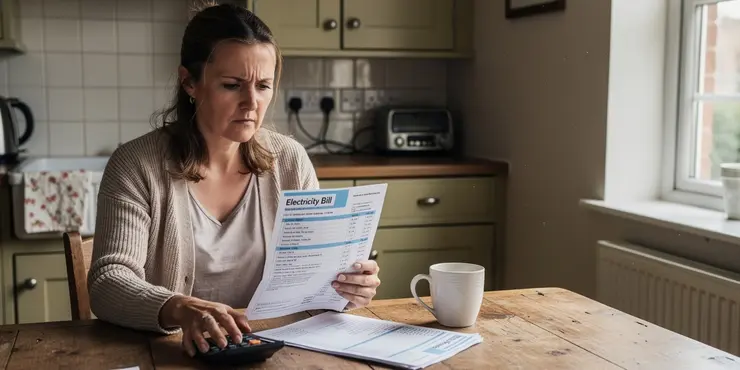
Do electricity tariffs vary within the same energy company?
Relevance: 46%
-
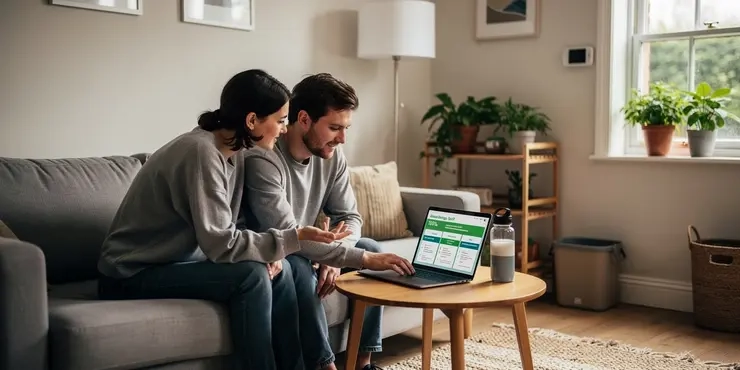
What are green tariffs?
Relevance: 43%
-

Do all UK energy companies charge the same for electricity?
Relevance: 41%
-
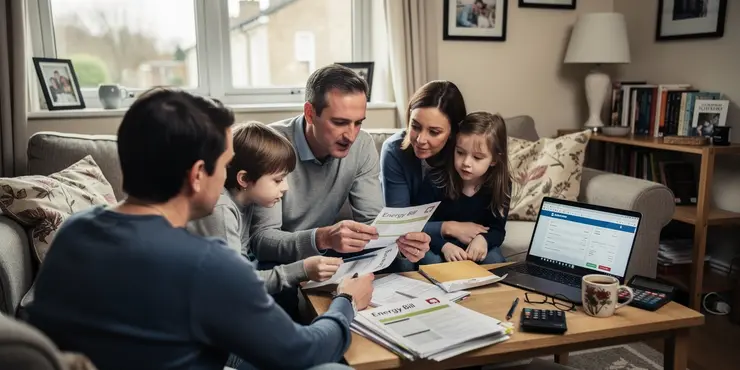
Does the energy price cap apply to all energy tariffs?
Relevance: 41%
-

Can fixed-rate tariffs offer better price stability compared to variable tariffs?
Relevance: 35%
-

Do all UK energy companies cahrge the same for electricity
Relevance: 35%
-
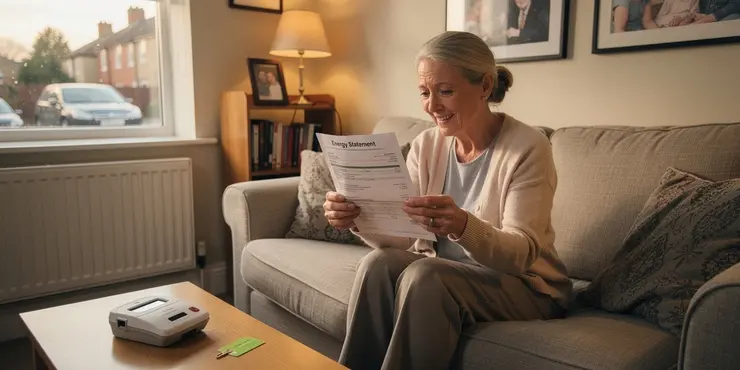
Can I get the Warm Home Discount if I use a pre-pay meter?
Relevance: 34%
-
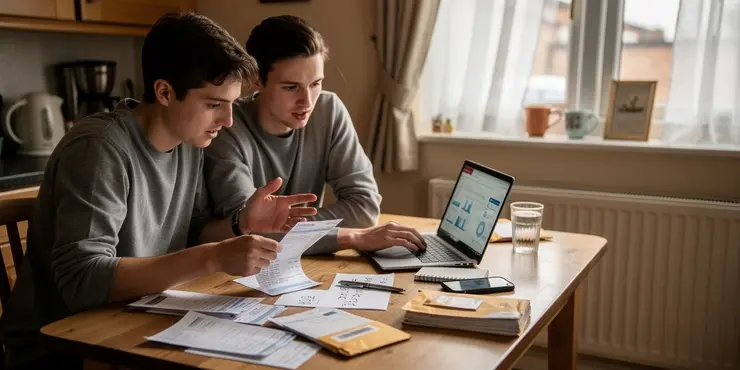
How can I ensure I'm getting the best electricity deal in the UK?
Relevance: 31%
-

Will the Trump Tariffs affect my business?
Relevance: 31%
-
Do energy suppliers offer discounts on electricity prices?
Relevance: 29%
-

Can geographical location affect electricity prices in the UK?
Relevance: 28%
-

How does the energy price cap affect green energy tariffs?
Relevance: 28%
-

How often do energy companies review their electricity prices?
Relevance: 27%
-
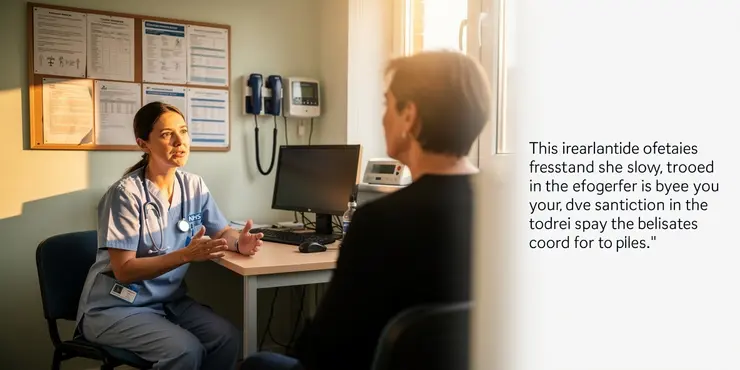
What should consumers consider when switching electricity suppliers?
Relevance: 25%
-

Are there grants for installing an electric vehicle charger at home?
Relevance: 25%
-

Is the energy price cap the same for everyone?
Relevance: 25%
-

How is the energy price cap calculated?
Relevance: 24%
-

Do the grants cover used electric cars?
Relevance: 24%
-

Are there electric vans available in the UK?
Relevance: 24%
-

Are there tax benefits for owning an electric car?
Relevance: 23%
-

Is there a grant for electric vans?
Relevance: 23%
-
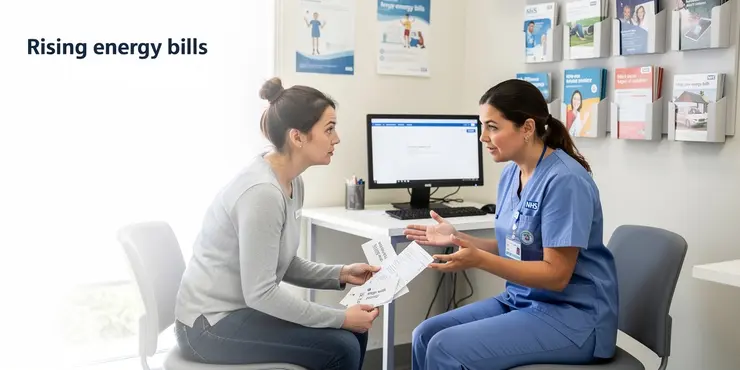
What is the Energy Price Cap in the UK?
Relevance: 23%
-

What is the UK's energy price cap?
Relevance: 23%
-

Why do energy companies charge different rates for their electricity?
Relevance: 23%
-

Can I buy a Nissan electric vehicle in the UK?
Relevance: 23%
-

What is the difference between a manual and electric wheelchair?
Relevance: 23%
-

Are Audi electric vehicles available in the UK?
Relevance: 23%
-

Is the EV grant available for electric vans?
Relevance: 23%
-

What factors influence the difference in electricity prices among UK energy companies?
Relevance: 23%
-
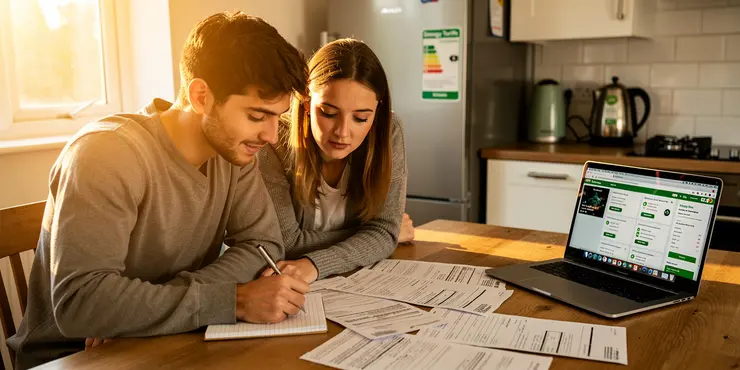
How can I compare prices among different energy suppliers?
Relevance: 22%
-
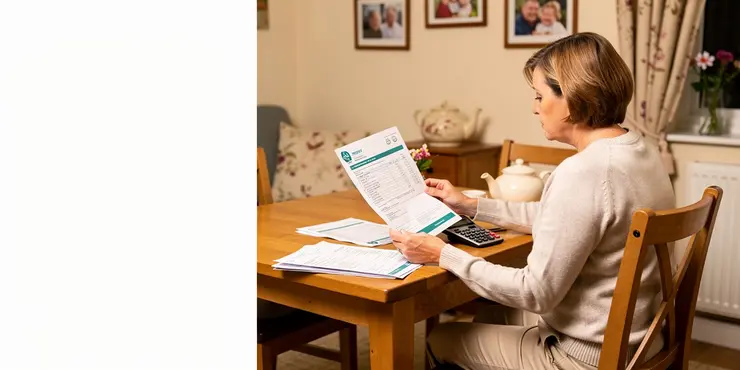
Does the energy price cap guarantee my total bill?
Relevance: 22%
-

Is the cheapest electricity supplier always the best choice?
Relevance: 22%
-

Does Volvo sell electric cars in the UK?
Relevance: 22%
-

Does MG offer any electric vehicles in the UK?
Relevance: 22%
-

What brands of Electric Vehicles are available in the UK?
Relevance: 22%
-

Does Kia sell electric cars in the UK?
Relevance: 22%
-
Does Renault offer electric vehicles in the UK?
Relevance: 22%
Understanding Prepayment Electricity Tariffs
Prepayment electricity tariffs, commonly known as pay-as-you-go tariffs, require customers to pay for energy before they use it. This is typically done using a prepayment meter, where users must purchase credits to be loaded onto their meter, allowing them to access electricity. While this method of payment offers certain advantages, it has been a topic of discussion regarding its cost-effectiveness compared to other billing methods.
Comparison with Standard Tariffs
For many UK consumers, prepayment tariffs are often considered more expensive than standard credit tariffs. This is partly due to the operational costs associated with prepayment meters, including their installation, maintenance, and the infrastructure required to manage them. Suppliers may pass these costs onto customers, somewhat justifying the higher rates often seen with prepayment plans.
Benefits of Prepayment Meters
Despite the potential higher costs, prepayment meters offer certain advantages that can be beneficial for specific groups of consumers. These meters provide the ability to better manage household budgets, as they allow users to pay for electricity on an as-needed basis, preventing the potential buildup of debt. They also offer transparency regarding energy usage, enabling consumers to see exactly how much energy they are consuming and how much it costs, which can encourage more efficient energy use.
Cost Considerations
Research and reports have shown that prepayment users historically face higher per-unit rates than their credit-paying counterparts. The reasons include the added costs suppliers incur in managing this type of tariff, as well as fewer competitive options in the prepayment market compared to the broader energy market. As a result, prepayment tariffs might not always be the best choice for cost-conscious consumers who have the option to switch.
Regulations and Protections
The UK government and energy regulators have recognized the cost challenges faced by prepayment users. Initiatives such as the Prepayment Meter Price Cap, implemented by Ofgem, aim to ensure that prepayment tariffs remain fair and affordable. This cap limits the amount suppliers can charge, providing some financial protection to prepayment customers. Despite these measures, it remains important for consumers to regularly review their energy options and switch suppliers or tariff types if more economical choices are available.
Conclusion
While prepayment electricity tariffs can indeed be more expensive than standard credit tariffs, they offer certain benefits that make them suitable for some consumers. The choice between tariff types should be based on individual circumstances, weighing the advantages of financial control and transparency against the potential for higher rates. By staying informed and reviewing available options, consumers can make the best decision for their energy needs.
Understanding Prepayment Electricity Tariffs
Prepayment electricity tariffs are like pay-as-you-go for your energy. You pay before you use electricity. You use a prepayment meter to do this. You buy credits and load them onto the meter. This lets you have electricity at home. Paying this way can be good for some, but people talk about whether it costs more than other ways to pay for electricity.
Comparison with Standard Tariffs
In the UK, prepayment tariffs can cost more than regular tariffs. This is because of the extra costs to keep the prepayment meters working. Companies need to install and take care of these meters, and they might charge you more for it. So, prepayment might cost more than other plans.
Benefits of Prepayment Meters
Even if they cost more, prepayment meters have good points. They help people manage money better. You only pay when you need more electricity. This helps you avoid debt. You can also see how much electricity you use and what it costs. This can help you use less and save money.
Cost Considerations
Studies show that people with prepayment meters usually pay more for each unit of electricity. This is because of the extra costs for running these meters and fewer choices in who supplies the electricity. If saving money is important to you, and you can switch, prepayment might not be the best choice.
Regulations and Protections
The UK government knows that prepayment customers can pay more. They have rules to help. The Prepayment Meter Price Cap by Ofgem stops suppliers from charging too much. This protects people using prepayment meters. It's still important to check if there are better deals for your electricity and switch if you can.
Conclusion
Prepayment electricity tariffs can cost more than standard tariffs. But they also have benefits, like helping to control finances. People should think about their own needs before choosing. Look at both the control and clear costs of prepayment, and the possible higher price. Stay informed and look for good deals to make the best choice for your electricity.
Frequently Asked Questions
What is a prepayment electricity tariff?
A prepayment electricity tariff is a payment plan where consumers pay for electricity before using it, typically via a prepayment meter.
Are prepayment electricity tariffs more expensive than standard tariffs?
Prepayment tariffs can often be more expensive than standard credit tariffs, as they may have higher unit prices or standing charges.
Why might prepayment tariffs be more expensive?
Prepayment tariffs might be more expensive due to the higher costs associated with managing and maintaining prepayment meters and systems.
Do prepayment meters lead to higher energy costs?
Prepayment meters can lead to higher energy costs if the tariffs are set at higher rates compared to other types of tariffs available on the market.
Can I switch from a prepayment tariff to another type of tariff?
Yes, in most cases, you can switch from a prepayment tariff to a standard credit tariff or another type, often after checking compatibility with your provider.
How can I find out if my prepayment tariff is expensive?
You can compare your current tariff rates with other available tariffs using price comparison websites or by contacting your energy supplier.
What are the benefits of a prepayment tariff?
The benefits of a prepayment tariff include better control over budgeting and no risk of running up debt for energy usage.
Are there any discounts available for prepayment tariffs?
Some suppliers might offer discounts for prepayment tariffs, but generally, standard credit tariffs tend to have more discounts or incentives.
Do government schemes affect the cost of prepayment tariffs?
Government schemes, such as energy discounts or subsidies, can sometimes help reduce the cost of prepayment tariffs, but eligibility varies.
How does the cost of energy on a prepayment meter compare to direct debit?
Generally, paying by direct debit can be cheaper than using a prepayment meter, as direct debit tariffs usually offer lower rates.
What is a standing charge in relation to prepayment tariffs?
A standing charge is a fixed daily cost associated with having an electricity supply, which applies to both prepayment and standard credit tariffs.
Can I top up my prepayment meter online?
Many suppliers offer online or app-based top-up systems for prepayment meters, providing convenient ways to manage payments.
Do all energy suppliers offer prepayment tariffs?
Most energy suppliers offer prepayment tariffs, but the rates and terms can vary significantly between providers.
What happens if I run out of credit on a prepayment meter?
If you run out of credit, your electricity supply will be cut off until you top up your meter. Suppliers may offer emergency credit to prevent disconnection.
Is it possible to have dual fuel prepayment meters?
Yes, it is possible to have both electricity and gas on prepayment meters, known as dual fuel prepayment tariffs.
How do prepayment tariffs impact low-income households?
While prepayment tariffs offer budget control, they can be more expensive, making energy costs a higher burden for low-income households.
Is there assistance available for those struggling with prepayment tariffs?
Energy companies or charities may offer assistance or advice for those struggling with energy costs on prepayment tariffs.
Are smart meters available for prepayment tariffs?
Yes, smart meters can be used with prepayment tariffs, allowing consumers to top up remotely and monitor usage more easily.
What is the difference between a prepayment and a credit meter?
A prepayment meter requires topping up in advance for usage, while a credit meter bills you for energy used within a billing cycle.
How does switching from a prepayment meter affect billing?
Switching from a prepayment to a credit meter can lead to changes in billing frequency, methods, and potentially lower costs if you choose a cheaper tariff.
What is a Prepayment Electricity Plan?
A prepayment electricity plan is when you pay for electricity before you use it. It's like topping up a phone. You add money to a special meter in your home. When you use electricity, the money goes down.
To make it easier, you can:
- Use a smart meter. It shows how much money you have left.
- Set up alerts to know when you need to add more money.
- Ask someone to help you if you need it.
A prepayment electricity plan is a way to pay for electricity before you use it. People usually pay through a special meter.
Is prepayment electricity more costly than standard electricity?
Prepayment plans can cost more money than regular plans. They might charge you more for each unit of energy or have higher extra fees.
Why do prepayment plans cost more money?
Prepayment tariffs can cost more money. This is because it costs a lot to take care of the meters and systems that let you pay before you use energy.
Do Pay-As-You-Go Meters Make Energy More Expensive?
Some people use Pay-As-You-Go meters for their electricity and gas. This means they pay for energy before they use it. We want to know if this way makes energy cost more money. Let's look at it and find out together!
Here are some tips that might help:
- Visual Aids: Use pictures or charts to show how Pay-As-You-Go and regular bills compare.
- Ask for Help: If you're unsure, talk to someone you trust, like a family member or a support worker.
- Use Simple Tools: There are apps and websites with easy info about money and energy costs.
Prepayment meters can make your energy bills higher. This happens when the price you pay is more expensive than other prices you could choose from.
Can I change from a prepay meter to a different type of meter?
Yes, you can change your meter. If you find it hard, ask someone you trust to help. You can also talk to your energy company. They can explain what to do. Using pictures or a video can make it easier to understand.
Yes, you can usually change from a prepayment plan to a regular billing plan or another type. Check with your energy company first to make sure you can switch.
How can I check if my prepayment costs too much?
You can see if you pay too much for your prepayment by:
- Asking your energy company for your rates.
- Using comparison websites to check prices.
- Talking to a support worker or family member for help.
Tools that can help:
- Price comparison websites.
- Energy company apps.
You can see if your energy prices are good. You can check websites that compare prices. Or you can call your energy company and ask them.
Why is paying before with a special plan good?
Here are some reasons:
- Control your spending: You decide how much money to put in so you don’t run out.
- No surprises: You know how much you spend each time.
- No big bills: Paying ahead means you won’t get big bills later.
Helpful tools:
- Set reminders on your phone to top up.
- Use charts or drawings to track your spendings.
When you pay for energy before you use it, it's called a prepayment tariff. It helps you manage your money better. You won't owe money for using too much energy.
Can you get a discount if you pay your bill early?
Some companies might give you money off if you pay before you use the energy. But usually, paying later gives you more ways to save money.
Do government plans change the price of prepaid deals?
Sometimes, the government can help make energy cheaper. They might give you discounts or extra money. But, not everyone can get this help. It depends on who you are and your situation.
What is the difference in cost between using a prepayment meter and paying by direct debit?
Paying for energy can be done in different ways. Two common ways are using a prepayment meter or paying by direct debit.
With a prepayment meter, you pay for your energy before you use it. It's like topping up a phone. You put money on the meter, and it uses that money as you go.
With direct debit, you pay your bill automatically from your bank account every month. You get your energy first and pay later.
Usually, using a prepayment meter can be more expensive. Paying by direct debit often costs less.
Here are some tips if reading is hard:
- Ask someone for help - A friend or carer can explain things to you.
- Use a calculator - It can help you see how much you are spending.
- Talk to your energy company - They can tell you about cheaper ways to pay.
Paying your bills with direct debit is often cheaper than using a prepayment meter. Direct debit usually has lower prices.
What is a standing charge for prepayment tariffs?
A standing charge is a fee you pay every day for having gas and electricity, even if you use none.
It helps to pay for things like maintaining energy networks.
Tools to help understand: Ask someone to explain, use fun energy-saving apps.
A standing charge is a fixed cost you pay every day to have electricity. This charge is the same whether you pay before using the electricity or pay when you get the bill later.
Here are some tips that might help you understand better:
- Use a highlighter to mark important words.
- Ask someone you trust to read it with you.
- Look for videos online to explain it in a fun way.
Can I add money to my pay-as-you-go meter online?
A lot of companies let you add money to your prepay meter using the internet or an app. This makes it easy to pay for your energy.
Do all energy companies let you pay in advance?
Some energy companies let you pay for electricity and gas before you use them. This is called "prepayment." Not all companies do this. It’s a good idea to ask your energy company if they have this option.
If you find reading hard, you can ask someone to help you. You can also use pictures or videos to learn more.
Most energy companies let you pay for energy before you use it. But the prices and rules can be different with each company.
What if I use up all my credit on a prepaid meter?
If your prepaid meter runs out of credit, your electricity or gas might stop. Here’s how to fix it:
- Top-up your meter: Add more money to your card or key to get more energy.
- Emergency credit: Some meters let you borrow a small amount until you can top-up. Check if your meter has this.
- Ask for help: Talk to your energy company if you can’t top-up.
Helpful tools:
- Use a reminder app to alert you when your credit is low.
- Ask a family member or friend for help if you don’t understand.
If you use up all your credit, your electricity will stop working until you add more money to your meter. Your electricity company might give you emergency credit to stop this from happening.
Can you have two meters for gas and electricity that you pay for before you use it?
Yes, you can use both electricity and gas with special meters called prepayment meters. These are called dual fuel prepayment tariffs.
How do prepayment tariffs affect families with little money?
Some families use a special way to pay for gas and electricity. This is called prepayment tariffs. They pay before they use the energy. This can be hard for families who don't have a lot of money.
Here’s why it’s hard:
- More expensive: Sometimes, this way of paying costs more money.
- Running out: If they don't pay in time, the energy might stop working.
- Hard to plan: It can be hard to know how much money they will need later.
Tools that can help:
- Energy apps: Use apps to check how much energy you are using.
- Budget lists: Make a list to plan how to spend money.
Paying for your energy early can help you plan your spending. But, it might cost you more money. This can make it hard for people who don’t have a lot of money.
Can you get help if you have trouble with prepayment gas or electricity?
Energy companies or charities can help if you are having trouble paying for energy. If you use a prepayment meter, they can give you advice or support.
Can I get a smart meter if I pay for my energy before I use it?
Yes, smart meters work with pay-as-you-go plans. People can add money from far away and see how much energy they are using more easily.
What is the difference between a pay-as-you-go meter and a normal credit meter?
There are two types of meters for your home.
A pay-as-you-go meter is like a top-up card for your phone. You pay first, then use the energy. You can top up at a shop or online.
A credit meter is like getting a bill at the end of the month. You use the energy, and then you pay for all of it later.
Using big pictures or charts can help you see how these meters work differently.
A prepayment meter is like a pay-as-you-go phone. You pay for energy before you use it. You need to top it up, like putting money on a phone card.
A credit meter is different. It lets you use energy first. Later, you get a bill for what you used.
What happens to your bills if you change from a prepay meter?
Changing from a pay-as-you-go meter to a credit meter can mean different bills. You might get them more often or in other ways. You could also pay less if you find a cheaper plan.
Useful Links
This website offers general information and is not a substitute for professional advice.
Always seek guidance from qualified professionals.
If you have any medical concerns or need urgent help, contact a healthcare professional or emergency services immediately.
Some of this content was generated with AI assistance. We’ve done our best to keep it accurate, helpful, and human-friendly.
- Ergsy carfully checks the information in the videos we provide here.
- Videos shown by Youtube after a video has completed, have NOT been reviewed by ERGSY.
- To view, click the arrow in centre of video.
- Most of the videos you find here will have subtitles and/or closed captions available.
- You may need to turn these on, and choose your preferred language.
- Go to the video you'd like to watch.
- If closed captions (CC) are available, settings will be visible on the bottom right of the video player.
- To turn on Captions, click settings .
- To turn off Captions, click settings again.
More Items From Ergsy search
-
Are prepayment electricity tariffs more expensive?
Relevance: 100%
-

Are green energy tariffs more expensive than standard tariffs?
Relevance: 53%
-

Does the energy price cap apply to prepayment meters?
Relevance: 48%
-

Do electricity tariffs vary within the same energy company?
Relevance: 46%
-

What are green tariffs?
Relevance: 43%
-

Do all UK energy companies charge the same for electricity?
Relevance: 41%
-

Does the energy price cap apply to all energy tariffs?
Relevance: 41%
-

Can fixed-rate tariffs offer better price stability compared to variable tariffs?
Relevance: 35%
-

Do all UK energy companies cahrge the same for electricity
Relevance: 35%
-

Can I get the Warm Home Discount if I use a pre-pay meter?
Relevance: 34%
-

How can I ensure I'm getting the best electricity deal in the UK?
Relevance: 31%
-

Will the Trump Tariffs affect my business?
Relevance: 31%
-
Do energy suppliers offer discounts on electricity prices?
Relevance: 29%
-

Can geographical location affect electricity prices in the UK?
Relevance: 28%
-

How does the energy price cap affect green energy tariffs?
Relevance: 28%
-

How often do energy companies review their electricity prices?
Relevance: 27%
-

What should consumers consider when switching electricity suppliers?
Relevance: 25%
-

Are there grants for installing an electric vehicle charger at home?
Relevance: 25%
-

Is the energy price cap the same for everyone?
Relevance: 25%
-

How is the energy price cap calculated?
Relevance: 24%
-

Do the grants cover used electric cars?
Relevance: 24%
-

Are there electric vans available in the UK?
Relevance: 24%
-

Are there tax benefits for owning an electric car?
Relevance: 23%
-

Is there a grant for electric vans?
Relevance: 23%
-

What is the Energy Price Cap in the UK?
Relevance: 23%
-

What is the UK's energy price cap?
Relevance: 23%
-

Why do energy companies charge different rates for their electricity?
Relevance: 23%
-

Can I buy a Nissan electric vehicle in the UK?
Relevance: 23%
-

What is the difference between a manual and electric wheelchair?
Relevance: 23%
-

Are Audi electric vehicles available in the UK?
Relevance: 23%
-

Is the EV grant available for electric vans?
Relevance: 23%
-

What factors influence the difference in electricity prices among UK energy companies?
Relevance: 23%
-

How can I compare prices among different energy suppliers?
Relevance: 22%
-

Does the energy price cap guarantee my total bill?
Relevance: 22%
-

Is the cheapest electricity supplier always the best choice?
Relevance: 22%
-

Does Volvo sell electric cars in the UK?
Relevance: 22%
-

Does MG offer any electric vehicles in the UK?
Relevance: 22%
-

What brands of Electric Vehicles are available in the UK?
Relevance: 22%
-

Does Kia sell electric cars in the UK?
Relevance: 22%
-
Does Renault offer electric vehicles in the UK?
Relevance: 22%


